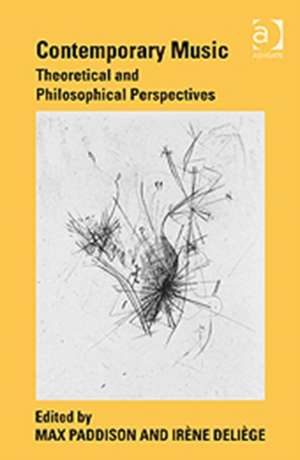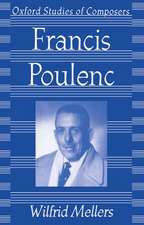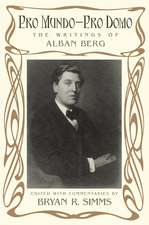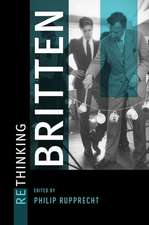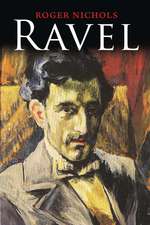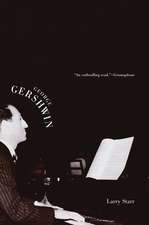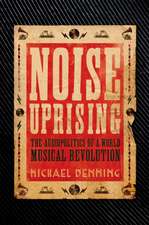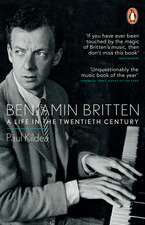Contemporary Music: Theoretical and Philosophical Perspectives
Autor Irène Deliège Editat de Max Paddisonen Limba Engleză Hardback – 28 sep 2010
| Toate formatele și edițiile | Preț | Express |
|---|---|---|
| Paperback (1) | 469.34 lei 6-8 săpt. | |
| Taylor & Francis – 6 sep 2016 | 469.34 lei 6-8 săpt. | |
| Hardback (1) | 1015.26 lei 6-8 săpt. | |
| Ashgate Pub Co – 28 sep 2010 | 1015.26 lei 6-8 săpt. |
Preț: 1015.26 lei
Preț vechi: 1238.12 lei
-18% Nou
Puncte Express: 1523
Preț estimativ în valută:
194.32€ • 202.10$ • 162.84£
194.32€ • 202.10$ • 162.84£
Carte tipărită la comandă
Livrare economică 14-28 martie
Preluare comenzi: 021 569.72.76
Specificații
ISBN-13: 9780754604976
ISBN-10: 0754604977
Pagini: 408
Dimensiuni: 156 x 234 x 24 mm
Greutate: 0.88 kg
Ediția:1
Editura: Ashgate Pub Co
Colecția Routledge
Locul publicării:Oxford, United Kingdom
ISBN-10: 0754604977
Pagini: 408
Dimensiuni: 156 x 234 x 24 mm
Greutate: 0.88 kg
Ediția:1
Editura: Ashgate Pub Co
Colecția Routledge
Locul publicării:Oxford, United Kingdom
Notă biografică
Max Paddison is Professor of Music Aesthetics, Department of Music, University of Durham, UK. He is the author of Adorno’s Aesthetics of Music and Adorno, Modernism and Mass Culture. Irène Deliège, University of Liège, Belgium, is founding editor of the journal Musicae Scientiae and founding member of ESCOM, the European Society of the Cognitive Sciences of Music.
Recenzii
'One of the most impressive theoretical and analytical achievements of this book is its promotion and development of a more 'harmonic' approach to contemporary music - even to the most radically pointillistic works of the early 1950s... the overall impression is of a concerted musicological effort to rethink new music beyond the fragmenting effects of Fortean pitch-set theory to sophisticated harmonic and polyphonic models that encourage the detailed and nuanced interpretation of individual works. It is not only in these large projects that this book succeeds, however. Some of the most eloquent and perceptive writers on contemporary music have been assembled here, and the details of the text are often as rewarding and provocative as the bigger picture... its overall contribution to contemporary music studies is substantial; it deserves to be a fixture on reading lists for many years to come.' Tempo 'Hats off to Max Paddison, who acted as an overall translator and translations editor. With great devotion he looked for English equivalents of sometimes almost untranslatable terms. This renders the essays of among others Deliège and Decroupet (who mostly publish in French and German) accessible to Anglophone readers in the best possible way... a coherent collection of essays and interviews...' Musicae scientiae
Cuprins
IntroductionContemporary Music: Theory, Aesthetics, Critical Theory; I: Theoretical Perspectives and Retrospectives; 1: The Principles of Music and the Rationalization of Theory 1; 2: Atonal Harmony: From Set to Scale; 3: In Search of Lost Harmony 1; 4: Against a Theory of Musical (New) Complexity 1; 5: Heterogeneity: Or, on the Choice of Being Omnivorous; 6: Varèse, Serialism and the Acoustic Metaphor; 7: 'I Open and Close'? 1; 8: A Period of Confrontation: The Post-Webern Years 1; II: Philosophical Critiques and Speculations After Adorno; 9: A Philosophy of Totality; 10: Possibilities for a Work-Immanent Contemporary Musical Logic; 11: Postmodernism and the Survival of the Avant-garde; 12: Material Constraints: Adorno, Benjamin, Arendt; 13: Towards an Aesthetics of Risk; 14: Music and Social Relations: Towards a Theory of Mediation; III: Creative Orientations; 15: Music, Ambiguity, Buddhism: A Composer's Perspective; 16: Artistic Orientations, Aesthetic Concepts, and the Limits of Explanation: An Interview with Pierre Boulez 1; 17: Failed Time, Successful Time, Shadowtime: An Interview with Brian Ferneyhough; 18: Sound Structures, Transformations, and Broken Magic:; 19: Hunting and Forms: An Interview with Wolfgang Rihm; Postlude:Helmut Lachenmann, Wolfgang Rihm and the Austro-German Tradition
Descriere
This collection of essays and interviews addresses important theoretical, philosophical and creative issues in Western art music at the end of the twentieth- and the beginning of the twenty-first centuries. The book offers a wide range of international perspectives from prominent musicologists, philosophers and composers. Part I is mainly theoretical in emphasis. Issues addressed include the historical rationalization of music and technology, new approaches to the theorization of atonal harmony in the wake of Spectralism, debates on the 'new complexity', the heterogeneity, pluralism and stylistic omnivorousness that characterizes music in our time, and the characterization of twentieth-century and contemporary music as a 'search for lost harmony'. The orientation of Part II is mainly philosophical, examining concepts of totality and inclusivity in new music. Part III offers creative perspectives, with new essays and interviews from important contemporary composers. A concluding essay by Alastair Williams provides a postlude to the book, while the whole collection is prefaced by an extended introductory chapter by Max Paddison which provides a context of ideas, and traces many of the issues discussed back to Adorno's seminal notion of une musique informelle.
